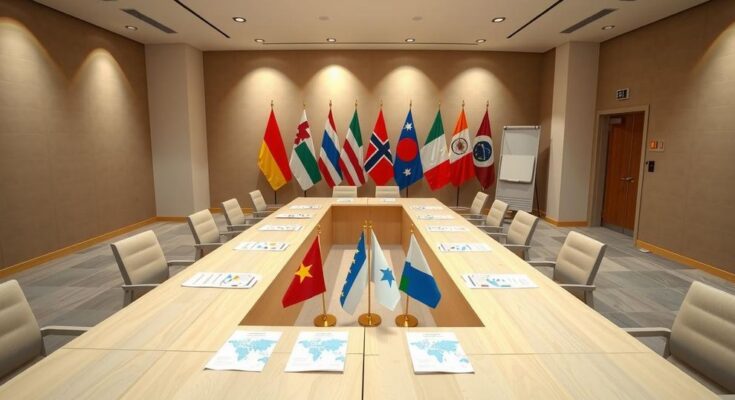On March 20, 2025, the Russian government revealed that Sergei Beseda would join Senator Georgy Karasin in negotiations with the U.S. in Saudi Arabia. The discussions, set for March 24, will focus on navigation safety in the Black Sea, amidst heightened geopolitical tensions. Beseda’s controversial past and active role in intelligence highlight concerns regarding Russia’s strategies and potential impacts on Ukraine. The negotiations represent a pivotal opportunity for both countries in addressing broader security issues.
On March 20, 2025, the Russian government announced the participation of Sergei Beseda, a notable figure in Russian intelligence, alongside Senator Georgy Karasin in upcoming talks with the United States in Er-Riyadh, Saudi Arabia. These negotiations, scheduled for March 24, are aimed at discussing initiatives concerning navigation safety in the geopolitically tense Black Sea region.
Sergei Beseda, involved in intelligence operations particularly concerning Ukraine, has a controversial history within the FSB. Born on May 17, 1954, much of his personal background is obscure, with his public roles gaining attention in the early 2000s. His ascent within the FSB included a deputy head position in 2003 and overseeing the agency’s Operational Information and International Relations Service by 2009.
Beseda’s strategic input has influenced Russia’s role in global organizations like the G8 and G20, affecting dynamics across former Soviet states and their political unrest, particularly in Ukraine. He became prominent during the February 2014 Euromaidan protests, when reports indicated he traveled to Kyiv purportedly to safeguard the Russian embassy while facing scrutiny regarding his true intentions and ties to the Kremlin’s influence in Ukraine.
Amidst speculation on March 20, 2022, concerning his arrest for misinforming the Kremlin about the Ukraine conflict, Beseda’s active participation at public events later dispelled those claims. His ongoing complex involvement raises considerable concern among Western observers and Ukrainian defense leaders, particularly from Kirill Budanov, head of Ukrainian military intelligence, who notes Beseda as a persistent threat due to his orchestrating efforts in Ukraine.
In addition to Beseda, Senator Georgy Karasin, 75, brings extensive experience in Russian foreign diplomacy to the delegation, having been associated with the Ministry of Foreign Affairs since the 1970s. His accumulated knowledge of geopolitical dynamics is crucial for the upcoming sensitive discussions with the United States.
Yuri Ushakov, aide to President Vladimir Putin, has confirmed the establishment of the American delegation and the objective of fostering productive dialogue between the two nations, primarily centered around issues in the Black Sea. Initial communications facilitating this meeting reportedly stemmed from discussions between Ushakov and U.S. National Security Advisor Mike Voltz, highlighting mutual interests.
Ushakov characterized the Russian negotiators as adept diplomats, emphasizing that the consultations will look beyond the Black Sea initiative to broader bilateral relations, potentially reopening discussions on various security-related matters. Despite skepticism regarding the negotiation process due to significant issues, including military aid to Ukraine, the prospects for economic dialogue and enhancing geopolitical stability remain vital.
Ultimately, the upcoming March 24 meetings in Er-Riyadh symbolize a pivotal moment not only for immediate Ukrainian concerns but also for the future of international security dialogues. The scrutiny of key figures like Sergei Beseda will be instrumental in shaping the narrative around Russia’s foreign strategies and its diplomatic stances on security challenges.
The forthcoming negotiations in Saudi Arabia epitomize a critical juncture for Russo-American relations concerning security in the Black Sea region. The pivotal roles of Sergei Beseda and Senator Georgy Karasin, along with the goal of the discussions to address navigation safety and broader geopolitical issues, highlight the importance of diplomatic engagement amidst ongoing tensions. The outcomes of these dialogues may have significant ramifications for international discourse and the future landscape of bilateral relations.
Original Source: evrimagaci.org




